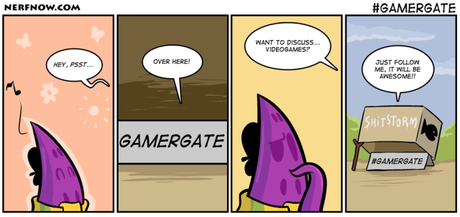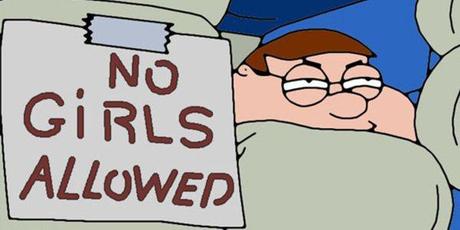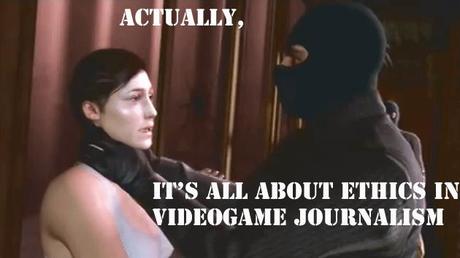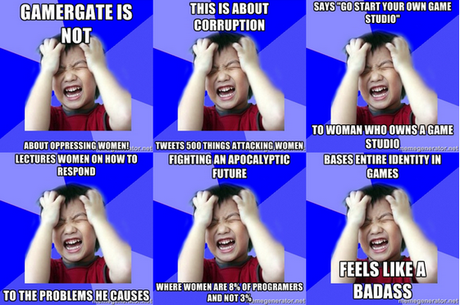Do you want to paint a target on yourself? Go on to any social media site and say something – anything – with the #gamergate hashtag. Regardless of your views on this topic using this phrase potentially puts you in the crosshairs. This doesn’t mean that you’re going to have stalkers at your door and death threats in your mailbox like Brianna Wu and Anita Sarkeesian, but you can expect bullying, labelling and plenty of accusations as to your motives.
On one side of the fence we have the group who claim that there is a culture of sexism in both video games and the people who play them, and this pervasive attitude is behind the recent controversies surrounding Zoe Quinn and her game Depression Quest. It was on the back of this issue that the term ‘gamergate’ first emerged. The other side of the fence is occupied by those who claim the real issue here is ethics in video game journalism, that reviewers were being influenced by their relationships with developers. The umbrella term ‘GameGate’ has been used by both factions, and has appeared millions of times on Twitter within months of being coined. Six months after it first appeared the expression still attracts lots of attention, attacks and criticism in all aspects of the media.
It’s time to stop using #gamergate.

This issue has come back onto our radar since Australian Pop Culture convention Supanova booked actor Adam Baldwin for one of their 2015 tours. We are fortunate in that we haven’t lived under a cloud of threats since the matter went public. Discussion on the Supanova Facebook and Twitter feeds has been heated and ongoing. Let’s try and summarise how we got to this point.
Two years ago game developer Zoe Quinn released the browser game Depression Quest. It was purported by some that the game had received undue positive attention due to the developer being a woman and her alleged relationships with journalists. Criticism turned in to harassment, which escalated in September 2014 when Quinn’s ex-boyfriend published a letter online where he claimed Quinn had conducted several affairs with men in the industry in order to further here career, in particular earning a positive review from online publication Kotaku. Although it was revealed that Kotaku had never published the alleged review, with the journalist in question having begun an affair with Quinn after commenting on the game in an article, Quinn was subjected to long term sexual and violent abuse. Anyone who criticised the actions of the harassment became targets themselves.

Baldwin coined the term ‘GamerGate’ when he shared videos criticising Quinn on his Twitter account, claiming that this was further proof of an enforcement of ‘arbitrary social justice rules’. The hashtag quickly overtook the phrase ‘Quinnspiracy’ in discussions about the issue. It became the common perception that the term was being used in the systematic harassment of female developers, their supporters and indeed anyone who criticised the current state of gender roles and perception in the gaming industry. Others promoted the use of the hashtag as a way to criticize the issues surrounding gaming journalism outlined above.
Herein lies the basic problem: we have two issues here. Yes, the two issues are intertwined and have come to the front of public awareness due to the same series of circumstance, but two issues nontheless. When #gamergate gets added to post about sexism in video games you immediately get a bunch of critics turning up claiming that it’s ‘actually about ethics in video game journalism’ – an expression that was so overused that it has become a punchline. Whenever someone would respond to an accusation of sexism by claiming it’s about journalism you immediately diminish the former issue in light of the latter. No doubt many insidious minds took this as an opportunity to dismiss an issue they disagreed with or felt uncomfortable with with the claim that it’s not the real issue at all.
So after six months of bickering, bullying and bullshit, the #gamergate hashtag should be dropped. And that’s not to say that the issues should be dropped. Sexism in games is an issue that needs examined and journalism ethics is an issue that needs to be on the table. Most importantly we need to treat them as two different issues because, as we’ve seen, the public can not get their shit together to reach a resolution on either when they’re both in the conversation.

Let’s look at issue #1: sexism in video games. Sexism, and gender representation, in video games is a thing that exists. Whether you like what Anita Sarkeesian said or not, she was right. The way women are depicted in gaming and, more importantly, the way women associated with the industry are treated, is not right. Women are treated as romantic or sexual objects in the bulk of gaming, and as we’re moving on as a society that trend will have to change. Games like Dead of Alive: Beach Volleyball will still exist because they’ll always be a market for it but it would be ideal for games to cover a wider gamut of gender representations. I have a son and a daughter who are both beginning to play games and I would like role models of all types for them.
Then there’s the sexual, violent and abusive harassment that people have been faced with. It’s downright despicable that anyone would act this way, especially in such ridiculously high numbers. Whatever crimes you think any of these women are guilty of they cannot be subjected to treatment. It’s low down, wretched and primitive behavior. If you do want to push the idea that the wrong thing has been done by these people then mounting threat upon threat on them is counter-productive to your agenda. The media and the public are going to focus on the threats, not your agenda. Either way, cut that shit out. The world is changing, gaming is evolving – accept it or find a new hobby.
In this context the hashtag #gamergate has become something of a call to arms, added to any post about gaming sexism for the sake of drawing the attention of trolls and harassers. Baldwin himself has been guilty of this, frequently retweeting his detractors and adding the tag as something of a beacon to his supporters to bully those he disagrees with.

Now, video game journalism. Let’s say, for example, that a writer was influenced by his relationships to write a positive review (which didn’t happen in this case). This is a thing that does happen across all journalism. As much as we like to think of the media as an unbiased moderator of the facts, the second you put human beings in the mix things go out the window. Gaming journalism is a relatively new profession, and it has largely been born out of the internet. The result is that we have a largely unregulated form of reporting which initially focused on a niche market. Things have changed over the years and the gaming industry pull in billions of dollars a year, with prominent outlets being followed by thousands and thousands of people. What they say matters, in that it has a dollar sign attached to it. Early reviews of the new release The Order 1886 has already seen a number of pre-order cancellations.
It’s time for the gaming journalism to re-evaluate itself, allow for greater scrutiny and be transparent about self-regulation and conflicts of interest.
Let’s get both of these issues on the table. Better yet, let’s get them on two separate tables. They can have their own hashtags, such as #gamingethics and #gamingsexism. This won’t solve the problems, or stop folks from being insufferably horrible people, but it means we can focus long enough to make progress. More importantly it will stop one issue being shot down in favour of another because someone is getting precious about their hashtag. It will help put a stop to anyone using the term from becoming a target for vicious harassers.
It has already been reported in Australia that some professionals have boycotted the Supanova convention for their inclusion of Adam Baldwin on the guest list and their overall handling of the matter, with some wanting to remain anonymous because the assumption is that such an action will result in further threats and harassment. Six months on any association with the hashtag still leaves people afraid. On their Facebook feed anyone who has expressed concerns about Baldwin’s appearance have been dubbed a ‘SJW’, a label that seems to exist solely to try and quash any opposition without the trouble of forming an argument or response of your own. The organisers of Supanova have now come forward to say that they have been on the receiving end of harassment as well.
In short, in the current situation nobody is gaining anything and nothing is being resolved. Perhaps someone smarter than me can come up with a way to put both issues at rest, as what I’ve presented here is quite a narrow look at the overall issues. All I can suggest is putting the hashtag #gamergate to rest and tackling these issues anew. And not be dicks.

